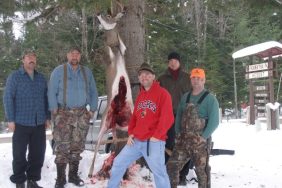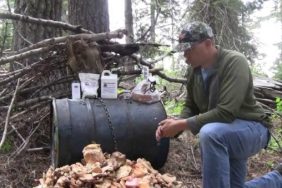 Some studies suggest that all Black Bears carry a parasitic disease known as trichinosis, so adequately cooking the meat is a must. It should be noted that properly prepared and cooked meat offers almost zero risk to anyone who eats it. Although trichinosis is worthy of any bear hunter’s concern, it is rare and it serves as a reminder that all hunters should take the absolute best care and precautions when it comes to field care of meat.
Some studies suggest that all Black Bears carry a parasitic disease known as trichinosis, so adequately cooking the meat is a must. It should be noted that properly prepared and cooked meat offers almost zero risk to anyone who eats it. Although trichinosis is worthy of any bear hunter’s concern, it is rare and it serves as a reminder that all hunters should take the absolute best care and precautions when it comes to field care of meat.
Unlike deer or elk, bear quarters are hard to cool with the hides still attached. They are built thicker than other animals and the density of their meat means slower cooling time. It is very important in warm weather to get that hide skinned off of all bear meat. Separating the quarters from the body is also a good way to expedite the cooling process.
I have been involved with around one hundred bear kills and most of those bears were able to be dragged out of the field whole, with no need to quarter in the field. However, you should always be prepared to completely skin, quarter and separate meat from body.
If you are hunting in any weather over 50 degrees, you need to know that bacteria is already going to work breaking down your bear. Bacteria means rot and rot means stench. Get that bear cooled off and try not to drive around with it for very long.
If you want to get it home whole but have concerns about warm temperatures, you can make sure the chest cavity is propped open with a stick and you can throw bags of ice inside the rib cavity. If no ice is available, you can grab some rocks from the waters of a creek or cool stream and place them inside of the cavity as well. The main thing is to get air to it and the ice or rocks are just a bonus.
If you are camping and hanging your meat from a meat pole, make sure it is double shaded. A single tarp might provide shade, but it still lets heat onto the meat. If you can have a double tarp set up with separation in between the tarps, one tarp will shade the bottom tarp and trap the heat before it gets to the meat. If you are under a heavy tree canopy, then a single tarp will do.
Regardless of your situation, you owe it to yourself and your animal to get that meat taken care of before bacteria claims it.








